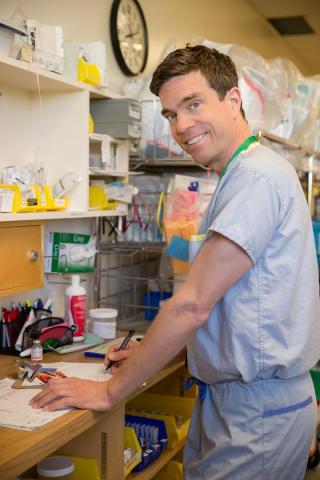- Managing your Practice
-
- Your Benefits
-

Introducing the ultimate Club MD experience
From work to play, and everything in between, we provide you with access to hundreds of deals from recognizable, best-in-class brands, elevating every facet of your life – from practice supports to entertainment, restaurants, electronics, travel, health and wellness, and more. Your Club MD membership ensures that these deals are exclusive to you, eliminating the need to search or negotiate.
Welcome to the ultimate Club MD experience. Your membership, your choices, your journey.
-
- Advocacy & Policy
-
- Collaboration
- News & Events
-

Stay Informed
Stay up to date with important information that impacts the profession and your practice. Doctors of BC provides a range of newsletters that target areas of interest to you.
Subscribe to the President's Letter
Subscribe to Newsletters
-
- About Us
-
Dr Tom Wallace – A surgeon with an engineer's eye
June 6, 2018
Doctors Making a Difference
When patients go into the hospital for surgery, everyone — especially the patient — wants the operation to go well with no complications, a quick recovery time and a short hospital stay.
Kamloops surgeon Dr Tom Wallace is helping lead a special approach — that includes the patient as a key team member — to achieve those results, by improving the whole system that patients go through when having their surgeries.
To do that, it helps to speak the languages of both medicine and engineering. Fortunately, Dr Wallace is fluent in both.
 The 42-year-old general surgeon at the Royal Inland Hospital in Kamloops not only has his medical degree from Dalhousie University and general surgery training from the University of Alberta, he also has an engineering degree from Queen's University.
The 42-year-old general surgeon at the Royal Inland Hospital in Kamloops not only has his medical degree from Dalhousie University and general surgery training from the University of Alberta, he also has an engineering degree from Queen's University.
It is a perfect combination for someone who is passionate about giving patients the best care in a systematic way. "Engineering is all about systems thinking, finding and fixing inefficiencies or variability in processes and outcomes. Surgery is very interesting to me to look at from a systems perspective. I recognized early on as a surgeon that it is not in patients' best interest to do excellent surgery but neglect the system they are going through."
When Dr. Wallace moved to Kamloops about a decade ago he first became a Surgeon Champion for the National Surgical Quality Improvement Program (NSQIP®), which enables surgical teams to collect data and conduct in depth analyses to better understand their patients’ outcomes and the quality of their care by comparing results to other hospitals.
With this information, he took the lead working with a team to put in place ERAS protocols — Enhanced Recovery After Surgery - which have more than 20 defined steps along the care path that have been shown in research to significantly reduce complications, speed healing, and shorten hospital stays.
First applied in Kamloops to colorectal surgery, ERAS' defined steps include, prior to surgery, educating the patient so they know what to expect and what they personally can do to help have a successful operation. A few hours before the operation, the patient is also given a sugary drink — like an athlete carbohydrate- loading before a big race — so that their body has enough energy on hand to heal. During the surgery, steps include keeping the patient warm and properly hydrated and minimizing narcotic anesthetics.
After surgery, steps include getting the patient to chew gum — that's because it stimulates the gut to get digestive juices flowing again after the operation. Then rather than just eat clear fluids, the patient is fed real food and encouraged to get up on their feet and walk around as soon as possible. Together these and other steps have been found to cut patient complication rates by 50% and cut length of hospital stay by 30 %.
"They are simple things, but together they can make a big impact," said Dr. Wallace.
Getting the patient motivated to speed their own recovery is key. For example, they are the ones who buy the gum and bring it to hospital. "Patients like it — it is a tangible thing they can do," says Dr. Wallace. "The patient is part of the team. The package of gum is taped to the patient chart so it becomes a visual reminder to everyone that we are all part of this process of improvement together. The patient knows about the gum, and they also know they need to get up and get moving as soon as they can."
Now ERAS protocols have been adopted, with Dr. Wallace's coaching, for urological and gynecological surgeries at the hospital.
"Tom has a real gift and passion for evidence-based medicine, organization, and implementation. He is a real leader who is excellent at motivating people," says Dr. Sean Gorman, Chief of Surgery for Royal Inland Hospital.
Dr. Wallace is delighted to be part of a new, province-wide initiative, also being led by the Specialist Services Committee. The Physician Quality Improvement Initiative trains interested physicians in quality improvement methods and techniques.
"Physicians are in a unique position to design, implement and monitor quality improvement projects, but it isn't something that they have been trained to do in medical school or residency. I am really excited that this more formal training program is underway and that QI is being recognized as an important skill for physicians to learn."
___________________
The development of ERAS was funded through the Specialist Services Committee, a partnership of Doctors of BC and the BC Government with representatives from health authorities. For more about ERAS click here.
Doctors of BC is interested in profiling physicians you know who are making a positive difference for their patients and in their communities. Drop us a line at with your suggestions.




